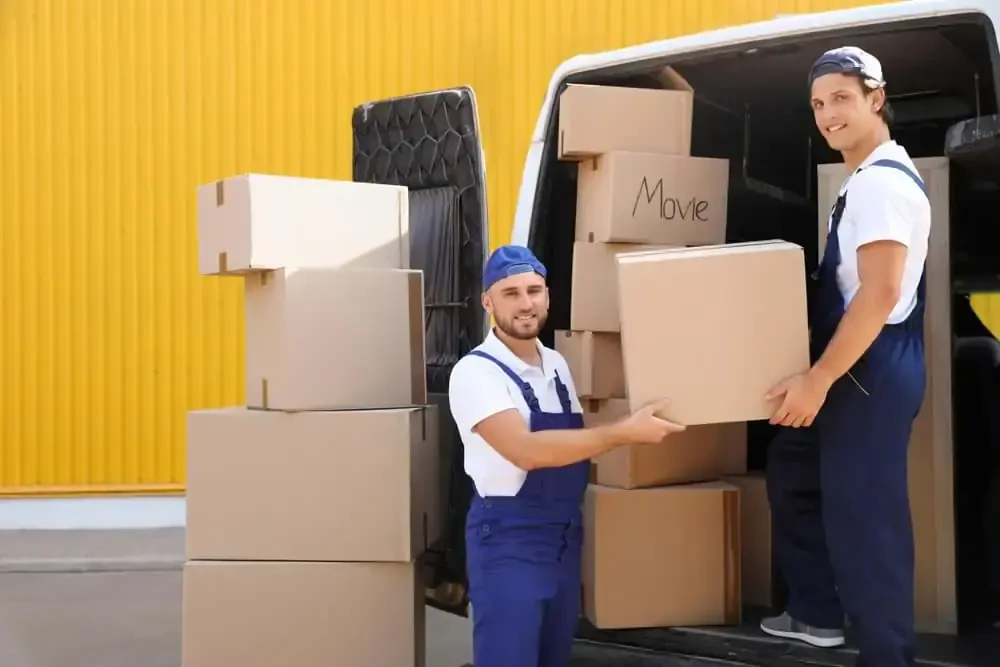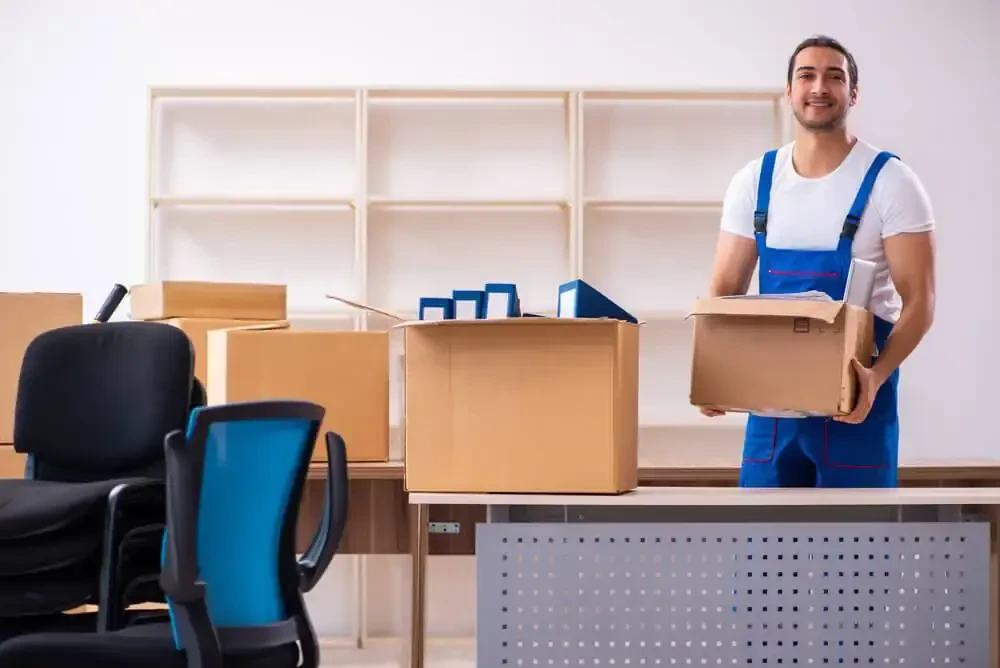Published by Chris Townsend
Last updated Dec, 03 2025

Local Movers in Washington, D.C. 2025
Washington DC, the nation’s capital, is renowned for its vibrant neighborhoods such as Georgetown, Capitol Hill, and Dupont Circle, each offering a unique blend of historic charm and modern living. The city is home to numerous government offices, cultural institutions, and iconic landmarks like the National Mall and the Smithsonian museums.
Navigating the busy streets and diverse districts of Washington DC can be challenging, especially during peak hours and special events. Whether you’re relocating to a cozy apartment in Adams Morgan or a spacious home in Chevy Chase, understanding the city’s layout and traffic patterns is essential for a smooth move.
Moving within Washington DC demands local expertise to handle the complexities of urban living, including parking restrictions, narrow roads, and tight building access. Our cheap local movers in Washington, D.C., specialize in providing affordable and efficient moving services that cater specifically to the needs of both residents and businesses in the District of Columbia.
With deep knowledge of the area’s neighborhoods and logistics, we ensure your belongings are transported safely and on time, making your relocation experience stress-free and budget-friendly.

How do I find the right local mover in the D.C. metro area?
Because Washington, D.C. sits in the middle of several jurisdictions, you may have trouble figuring out what body your hauling vendor is accountable to. It will depend on which part of the area you are moving around in. Since the city is a District and a City, but not part of a state, movers conducting business exclusively within the city limits only need a business license and liability insurance. But it's unlikely that many companies will limit their operations to that footprint. If they cross a state line, which seems likely, then they are under the authority of the Federal Motor Carrier Safety Administration, FMCSA, which governs interstate moves.
Other Local Moving Companies in Washington, D.C.
Washington, D.C. hosts several small, regionally focused moving companies that specialize exclusively in local moves within the area. These companies understand the unique challenges of moving in the District of Columbia and offer tailored services that cater specifically to local residents and businesses. Their deep knowledge of neighborhood logistics, parking regulations, and traffic patterns helps ensure smooth, efficient relocations at competitive prices.
Among the top local movers in Washington, D.C., are:
- Capitol City Movers
Known for their personalized service within the District of Columbia, they offer affordable rates combined with careful handling of your belongings, making them a trusted choice for many Washingtonians.
- DC Neighborhood Movers
This company focuses solely on the Washington metropolitan region, providing cheap moving options designed specifically for urban clients who need reliable and cost-effective solutions.
- Metro Affordable Movers
Offering budget-friendly relocation services throughout the capital city, they emphasize customer satisfaction and local expertise, ensuring every move is handled with professionalism and care.
These small, dedicated companies provide excellent alternatives to larger national chains, delivering customized, cheap moving services that fit the needs and budgets of DC residents.

What other services are on the estimate?
The shipment's weight or the time required to complete the move is usually the most significant component of a move's cost. Other factors are the services you request and things that increase the labor needed. For example, if you want the transporters to pack and load your goods, that is a lot of additional work. Shifters are professionals, so they can pack glassware, dishes, linens, and other things more quickly and efficiently than you can, most likely. Remember that they won't decide what should get tossed aside as they go along, so everything gets packed. This choice eliminates an excellent opportunity to reduce what you take as you move. On the other hand, paying the movers to pack does ensure that your belongings are packed correctly, and if something breaks, the movers are responsible for the damage.
Example Costs for Cheap Moving in Washington, D.C.
Typical cheap moving costs in Washington DC vary by distance and size:
- Local 1-bedroom apartment move within DC: $300-$450 (considered cheap under $500)
- 2-bedroom move to Baltimore (~40 miles): $700-$900 (cheap under $1,000)
- 3-bedroom move to Alexandria, VA (~10 miles): $500-$700 (cheap under $800)
- Studio move to Arlington, VA (~8 miles): $250-$400 (cheap under $450)
- Small office move within DC: $600-$850 (cheap under $900)
These prices reflect budget-friendly moving services in the Washington metropolitan area.

How do I get reimbursed if something breaks?
Questions about liability for damage and conflicts about losses cause many complaints against moving companies. If the move is not interstate, make sure that you check with the mover about their responsibility. Some states and localities have requirements, and others do not, so you must ask beforehand. Don't assume, and don't accept a vague assurance that "everything is covered." Get details in writing and decide how much coverage is sufficient for your peace of mind.
If the move is across state lines, you must decide how much coverage you need before signing the contract. Movers will include two choices in the estimate that they provide to you. The default choice, "released value" liability, is included in the move's cost at no additional charge. It is limited and will likely not provide enough to replace something you lose. This level's limit is $0.60 per pound, calculated by item or carton. If something happens, most of your possessions will be impossible to repair or replace with that allowance. For example, if your flat-screen television weighs twenty pounds, a $12.00 reimbursement will not be enough to replace or repair it.
The mover will offer a second option in the estimate, usually called Full Value or Replacement Value coverage. This protection level will replace items lost or damaged (with some exceptions) up to the shipment's declared value. The catch is that this is not included in the move's price; you must pay extra for it, and there will likely be a deductible. The exceptions to coverage are for items you packed (if the box is not damaged, but something inside is, then the mover will claim that it was not adequately packed) and anything of extraordinary value that was not declared. Extraordinary value is generally anything worth over $100 per pound, so list precious items individually and agree with your mover on the total value for the shipment.
Whichever coverage option you select, inspect your shipment when you receive it to determine if everything is accounted for and intact. If there are any discrepancies, contact your mover directly to see if the issue can be resolved and file a claim if necessary. For local moves in the City of Washington, D.C., or inside Virginia or Maryland like DC to Baltimore, double-check the time limits for filing a claim. If the move is state to state, you have nine months from the delivery date to do so.

Get A Free Moving Quote Today!
Get a free moving quote today from Three Movers and discover how easy and affordable your Washington DC move can be! Whether you're relocating across town or just down the street, our trusted local experts provide fast, no-obligation estimates tailored to your needs. Don’t wait-start your stress-free, cheap moving journey now!
Frequently Asked Questions
Local moves in Washington, DC generally range $450–$1,400 for typical apartments and $1,000–$2,000+ for larger homes. Costs reflect 2–4 movers, packing needs, building access, elevator reservations, loading zones, and DC traffic patterns around downtown, Capitol Hill, and Dupont Circle. Moves usually run 3–7 hours, depending on stairs, long carries, and special items. Delivery is same day for nearly all local jobs. For broader cost context, see the average cost of local moving company.
Most DC local moves take 3–7 hours for apartments and 6–10 hours for multi-level houses. Timing varies based on unit size, packing level, parking proximity, freight elevator windows, narrow streets in neighborhoods like Georgetown, and mid-day traffic along major corridors. Additional time is common when buildings require loading dock reservations or have strict move-in windows. Crews typically include 2–4 movers, which directly affects load and unload speed.
Many DC apartment and condo buildings require freight elevator reservations and time-restricted loading dock access. Street parking for moving trucks may require temporary permits in more congested zones. Scheduling these ahead helps avoid fines or delays. Complexes in areas like Navy Yard, Petworth, and Downtown often enforce specific move-in/move-out windows. Movers coordinate around these restrictions to keep timing predictable.
Same-day service is often available for small to medium DC moves, especially weekdays outside peak season. Availability depends on crew schedule, access issues, and whether packing is needed. Urgent requests in high-traffic areas or buildings with strict rules may require flexible start times. For fast turnaround, review options from same day movers.
Yes. DC movers commonly offer full or partial packing, including fragile-only services. Packing adds time and cost but is useful for high-rise apartments, busy schedules, or delicate items. Costs reflect box quantity, materials, and whether prep happens the day before or the morning of the move. See available packing and unpacking service for typical options.
Hourly pricing is standard for DC local moves, typically with a 3–4 hour minimum. Flat rates may be offered for simple, predictable routes or small apartments. Hourly billing is more transparent for moves affected by traffic, elevator delays, long carries, or multi-stop jobs. Crews usually include 2–4 movers, and additional movers increase hourly cost but shorten total time.
Local DC moves generally stay within the metro area, typically under 50–100 miles. Moves inside DC, to nearby Maryland or Northern Virginia, fall into this category. These use hourly labor instead of weight-based or mileage-based pricing. Traffic along the Beltway or downtown grid can affect timing, but delivery is same day for almost all local service.
Many local crews are trained to move heavier or fragile items with padding, reinforced dollies, and door-frame protection. Specialty items may require extra manpower or equipment and can extend loading time. Access factors such as tight stairwells, historic row houses, or limited street parking directly influence planning and cost. For specialty handling, compare options from furniture movers.


